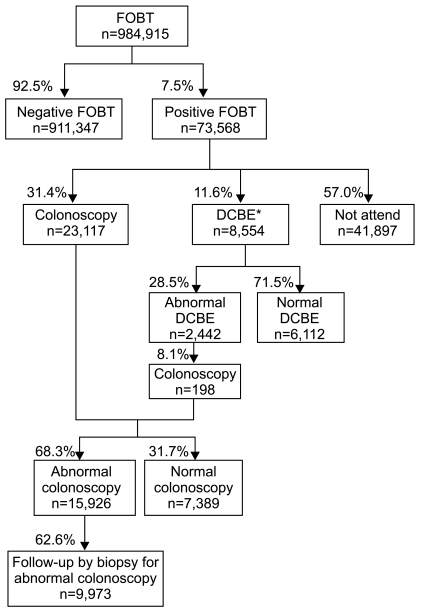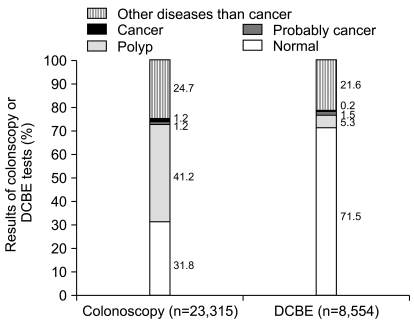Cancer Res Treat.
2010 Dec;42(4):191-198.
Results of Colorectal Cancer Screening of the National Cancer Screening Program in Korea, 2008
- Affiliations
-
- 1Division of Cancer Early Detection, National Cancer Center, Goyang, Korea. yeonju.kim@gmail.com
- 2Epidemiology Program, Cancer Research Center of Hawaii, University of Hawaii, Honolulu, HI, USA.
- 3National Cancer Control Institute, National Cancer Center, Goyang, Korea.
Abstract
- PURPOSE
This study aims to investigate the current situation of national colorectal cancer screening by analyzing participation rates, positive rates of screening methods and screening rate of secondary screening tests in colorectal screening of the national cancer screening program in 2008.
MATERIALS AND METHODS
With database about target population and screened individuals of the national cancer screening program, the results of target population and participants of colorectal cancer screening in 2008 were analyzed. Among adults aged over 50 years of medical aid and beneficiaries of national health insurance paying lower 50% premiums in the total subscribers, 4,640,365 were target population of colorectal cancer screening and the data of 984,915 undergoing fecal occult blood test (FOBT) as a primary screening were analyzed.
RESULTS
The colorectal cancer screening rate was 21.2% and the rates of national health insurance subscribers, females and the elderly aged 60-64 years were higher than those of others. The recipients with a positive result in FOBT recorded approximately 7.5%. Medical aid beneficiaries (7.9%), males (8.8%) and seniors aged over 75 years (9.1%) showed higher positive rates than the average one. Out of the FOBT positive recipients, 43.0% took a secondary screening and the rate undergoing colonoscopy (31.4%) was higher than that of doing double-contrast barium enema test (11.6%).
CONCLUSION
Colorectal cancer screening rate of medical aid beneficiaries and people paying lower 50% premiums among national health insurance subscribers, was different according to demographic characters (gender, age and types of health insurance). This finding meant that screening for the vulnerable needed to be encouraged by considering socio-demographic characters. Additionally, more efforts were necessary to increase the secondary screening rate of people with a positive result in primary one.
MeSH Terms
Figure
Reference
-
1. Levin B, Lieberman DA, McFarland B, Andrews KS, Brooks D, Bond J, et al. Screening and surveillance for the early detection of colorectal cancer and adenomatous polyps, 2008: a joint guideline from the American Cancer Society, the US Multi-Society Task Force on Colorectal Cancer, and the American College of Radiology. Gastroenterology. 2008; 134:1570–1595. PMID: 18384785.
Article2. Smith RA, von Eschenbach AC, Wender R, Levin B, Byers T, Rothenberger D, et al. American Cancer Society guidelines for the early detection of cancer: update of early detection guidelines for prostate, colorectal, and endometrial cancers. Also: update 2001--testing for early lung cancer detection. CA Cancer J Clin. 2001; 51:38–75. PMID: 11577479.
Article3. Whitlock EP, Lin JS, Liles E, Beil TL, Fu R. Screening for colorectal cancer: a targeted, updated systematic review for the U.S. Preventive Services Task Force. Ann Intern Med. 2008; 149:638–658. PMID: 18838718.
Article4. U.S. Preventive Services Task Force. Screening for colorectal cancer: U.S. Preventive Services Task Force recommendation statement. Ann Intern Med. 2008; 149:627–637. PMID: 18838716.5. Ministry of Health and Welfare. Annual report of the Korea Central Cancer Registry. 2007. Seoul: Ministry of Health and Welfare.6. Korea National Statistical Office. Annual report of the cause of death statistics. 2007. Daejeon: Korea National Statistical Office.7. Lee BH, Jeong SY. Korean national recommendation guidelines on screening and surveillance for early detection of colorectal cancers. J Korean Med Assoc. 2002; 45:981–991.
Article8. Han DS, Park JY, Yun HR, Bae SC. Cost-effectiveness analysis of colon cancer screening by colonosopic examination in Korea. Korean J Gastrointest Endosc. 2004; 28:1–8.9. Park SM, Chang YJ, Yun YH, Yoo TW, Huh BY, Kwon S. Cost-effectiveness analysis of colorectal cancer screening in Korean general population. J Korean Acad Fam Med. 2004; 25:297–306.10. Choi KS, Park EC, Shin HR, Kim CM, Oh DK. National cancer screening program in Korea. J Korean Assoc Cancer Prev. 2004; 9:116–122.11. Ministry of Health and Welfare. National cancer screening programes guideline. 2008. Seoul: Ministry of Health and Welfare.12. Smith RA, Cokkinides V, Brawley OW. Cancer screening in the United States, 2008: a review of current American Cancer Society guidelines and cancer screening issues. CA Cancer J Clin. 2008; 58:161–179. PMID: 18443206.
Article13. UK Colorectal Cancer Screening Pilot Group. Results of the first round of a demonstration pilot of screening for colorectal cancer in the United Kingdom. BMJ. 2004; 329:133. PMID: 15237087.14. Wilkins K, Shields M. Colorectal cancer testing in Canada--2008. Health Rep. 2009; 20:21–30. PMID: 19813436.15. National Cancer Center. Support and evaluation of national cancer control program. 2010. Goyang: National Cancer Center.16. National Health Insurance Corporation. National health screening statistical yearbook. 2008. Seoul: National Health Insurance Corporation.17. Kwon JH, Choi MG, Suh JP, Chang JH, Nam KW, Park HS, et al. The significance of fecal occult blood testing to screen for colon cancer. Korean J Gastrointest Endosc. 2007; 35:68–73.
- Full Text Links
- Actions
-
Cited
- CITED
-
- Close
- Share
- Similar articles
-
- Screening strategy for colorectal cancer according to risk
- Trends in Cancer-Screening Rates in Korea: Findings from the National Cancer Screening Survey, 2004-2023
- Evidence-based National Cancer Screening program of Korea
- Colon Cancer Screening—Is It Necessary to Start under the Age of 50?
- The impact of COVID-19 on screening for colorectal, gastric, breast, and cervical cancer in Korea



